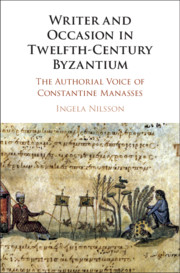
-
Select format
-
- Publisher:
- Cambridge University Press
- Publication date:
- December 2020
- December 2020
- ISBN:
- 9781108910217
- 9781108843355
- 9781108824262
- Dimensions:
- (228 x 152 mm)
- Weight & Pages:
- 0.48kg, 232 Pages
- Dimensions:
- (229 x 152 mm)
- Weight & Pages:
- 0.35kg, 232 Pages
You may already have access via personal or institutional login
Book description
In twelfth-century Constantinople, writers worked on commission for the imperial family or aristocratic patrons. Texts were occasioned by specific events, representing both a link between writer and patron and between literary imagination and empirical reality. This is a study of how one such writer, Constantine Manasses, achieved that aim. Manasses depicted and praised the present by drawing from the rich sources of the Graeco-Roman and Biblical tradition, thus earning commissions from wealthy 'friends' during a career that spanned more than three decades. While the occasional literature of writers like Manasses has sometimes been seen as 'empty rhetoric', devoid of literary ambition, this study assumes that writing on command privileges originality and encourages the challenging of conventions. A society like twelfth-century Byzantium, in which occasional writing was central, called for a strong and individual authorial presence, since voice was the primary instrument for a successful career.
Reviews
'Here is a brilliantly written book that demonstrates an in-depth knowledge of the work of Constantin Manassès, while going off the beaten track to throw a new look at his writing.'
Anna Lampadaridi Source: Review of Byzantine Studies
Contents
Metrics
Full text views
Full text views help Loading metrics...
Loading metrics...
* Views captured on Cambridge Core between #date#. This data will be updated every 24 hours.
Usage data cannot currently be displayed.
Accessibility standard: Unknown
Why this information is here
This section outlines the accessibility features of this content - including support for screen readers, full keyboard navigation and high-contrast display options. This may not be relevant for you.
Accessibility Information
Accessibility compliance for the PDF of this book is currently unknown and may be updated in the future.


